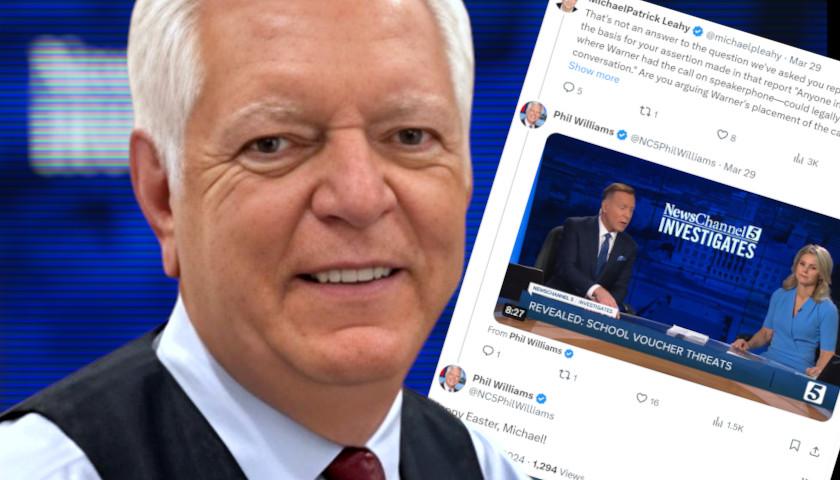Live from Music Row Wednesday morning on The Tennessee Star Report with Michael Patrick Leahy – broadcast on Nashville’s Talk Radio 98.3 and 1510 WLAC weekdays from 5:00 a.m. to 8:00 a.m. – host Leahy welcomed the executive director for the Tennessee Coalition for Open Government, Deborah Fisher to the newsmaker line to discuss the Nashville Post lawsuit filed by journalist Stephen Miller and explains the deliberative process privilege action that was used as an excuse not to provide requested records.
Leahy: We are joined now on our newsmaker line by our very good friend, Deborah Fischer, who’s the head of the Tennessee Coalition for Open Government. It’s a nonpartisan nonprofit organization that advocates for transparency in government. Good morning, Deborah!
Fisher: Good morning. Glad to be here.
Leahy: And your website is tcog.ifo. Well! This is very interesting because you have written about a very interesting story that we are tracking.
A Nashville Post journalist had filed a public records lawsuit over the state’s McKinsey’s reports. The state refused to make these available to Stephen Elliot because they said there was something called the “deliberative process privilege.” I’ve never heard of it! What is going on?
Fisher: (Chuckles) You’ve probably never heard of it because it’s not in statute. It’s not a typical exemption to the public records law. But what basically the state is saying and what the governor’s administration is saying is that because the reports may be used in their decision making about different things, COVID, about government efficiency, they are deliberative in nature.
And so they’re using that claim as a way to not release the reports. And obviously, the lawsuits challenge that rightly so. Because if that were the case, you could pretty much cover up any document and state government as part of the information used to make a decision.
Leahy: What fascinates me about this is that I went to Stanford Business School and got an MBA many years ago. And the plumb job to get back then and still today, if you went to a top business school was to be a consultant with McKinsey.
They are like the dominant player. They advise Fortune 500 companies. They advise all the globalist companies. They get huge amounts of money. In essence, having young, smart people write reports that give cover to management to do what they want to do. I’m just broadly describing it.
(Fisher chuckles) The state of Tennessee paid McKinsey $3.8 million for certain reports about how to make government more efficient during COVID. The reports were done in April and October of 2020. I would just love to see those reports. And I think I along with the Nashville Post reporter Steven Elliott, and you, we ought to be able to see those reports.
Fisher: Yes. And they did cost quite a bit of money. And in addition, what’s sort of interesting about this is that McKenzie was commissioned as part of a no-bid contract, which the state legislature is separately looking into the no-bid contracts that took place during COVID.
But that’s unrelated to this lawsuit. But just a little aside on that. But you’re right. This report cost a lot of money. And basically, the state taxpayers paid for it. $3.8 million supposedly should have some golden nuggets in that report, and the public should be able to see it.
Leahy: We asked you what the recommendations were. Can I tell you a little secret because I did work for a management consulting firm right out of business school. It was a firm called Arthur D. Little, and we’d go in and we’d look at the details.
I remember there was one of the big projects I worked on had to do with an aerospace company. And we would go and look at what they did and analyze the data. And then we organized the data and we’d do all these PowerPoint presentations and then make a recommendation.
But pretty much we took what the company had, reformatted it, and they paid us a lot of money to deliver recommendations that were really what the guy that hired us wanted to be done. I suspect that’s what this report contains.
Fisher: Yes. Well, we don’t know. There are actually three parts to the report. One of the parts of the report were case studies and data and an analysis of government operations during COVID. Things like the remote work. The in-person services that were delivered.
The idea with how to get Tennessee back open after COVID. That was another part of the report. So it encompassed a lot of different material, actually, in the contract itself. The contract says it’s not for policy advice.
So a lot of the material in the report is actually just factual data about what the state was doing, assumingly. I mean, that’s what the contract says it’s supposed to be about. So there really shouldn’t be anything in here that is sensitive or secret.
And I think that’s our real problem. The real problem with not releasing this, it makes it sound like these are somehow state secrets that if released would be somehow damaging. But I’m not sure how that would be exactly. I think that’s what puzzles everyone on why the state won’t release it.
Leahy: Now Steven Elliott’s lawsuit claims, according to your article on this that “the asserted deliberative process privilege has not been established by statute binding case law or other state law and is not an exception to the Tennessee Public Records Act.”
If that assertion is true, it doesn’t seem like there’s any precedent here. Where did they come up with this precedent?
Fisher: Well, you’re right. It has not been established as an exception in any of the court cases. There have been some court cases that have mentioned deliberative process privilege as something that might exist. But in Tennessee, it really hasn’t been defined.
And I think that the question will be, will the courts get to define it, or will they say, as they’ve said before, that the General Assembly is who decides the exceptions to the Public Records Act? So that’s one thing.
But in states where the deliberative process has been established, the idea behind it is it’s supposed to protect those conversations between your top government officials, like the governor and his closest advisers, so that they can have frank and candid conversations and any memos of those conversations might be confidential.
That’s sort of the idea behind the deliberative process. But what we’re seeing is even though it’s not been recognized in Tennessee, it’s being applied well beyond, say, the conversations between the governor and his closest advisor. This is a consultant report.
Leahy: It’s a little shocking to me that Governor Lee is sort of kind of inventing this concept of deliberative process privilege. This is from your article. The Memorandum of Law filed with the Elliott lawsuit observes that the first mention of deliberative process privilege in Tennessee appellate courts was in a 2004 ruling involving a federal public defender who sought a District Attorney’s files about potential new evidence in a death row inmate case. That’s 2004. That’s not exactly a long precedent period.
Fisher: Right. And this governor is not the first governor to assert it. Governor Haslam asserted it in terms of access to his daily schedule. So it has been asserted by governors. But I will say that. And I’m not sure why Governor Lee’s administration has been doing this as well.
I mean, I don’t find the administration hostile to transparency, for example. But this particular assertion has seemed to be applied much more liberally. Also mentioned in the article, I’ve heard a lot about it from journalists who will call, and they’ll say, what is this?
For example, a while back, the governor had asked all of his 22 agencies, the Department of Health and so forth, to basically assess rural services and how rural services could be improved.
And then when those reports were requested by the news media, how can we approve? What are the state agencies saying? The governor’s office claimed that those were confidential.
Leahy: Deborah Fisher, with the Tennessee Coalition for Open Government. Thanks so much for coming on. And as this case moves through the courts, will you come back and give us an update?
Fisher: Absolutely. Thanks for having me.
– – –
Tune in weekdays from 5:00 – 8:00 a.m. to the Tennessee Star Report with Michael Patrick Leahy on Talk Radio 98.3 FM WLAC 1510. Listen online at iHeart Radio.
Photo “Deborah Fisher” by Tennessee Coalition for Open Government.








